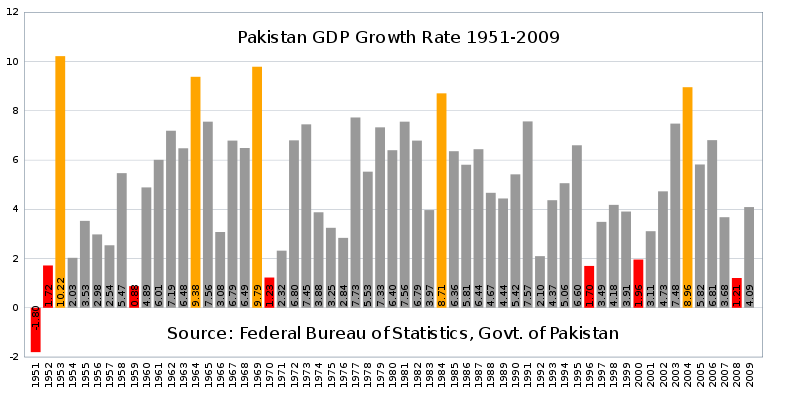The only examples of industrialized prosperous democracies in the developing world are Asian Tiger countries like South Korea, Taiwan, Malaysia, Indonesia which grew rapidly under benevolent dictators before becoming democracies. The economic and industrial development under dictators in these countries produced large middle class before democracy took roots.
First, we are different. We are not East Asia. We are at the cusp of South Asia, Central Asia, & Middle East. We are very different from East Asians as a people. You would be better off looking closer to Pakistan for more appropriate examples.
Second, your list does not fit. Indonesia does not belong in the group. You just put it there for bolstering your argument. It has been a democracy for the last three decades and its growth has been remarkable, as opposed to the former times. I do not know why Malaysia has also been included by you? Do you mean to say that Dr. Mahatir Muhammad was not an elected leader? And that political stability was not a major contributing factor?
Third, their engagement with USA was different. The remaining two countries have been consistent recipients of US aid, military and otherwise. The US was very supportive in developing their economies by providing them market access. South Korea and Taiwan were in direct conflict with Communist states. Hence USA propped their regimes, and spent considerable amount to subsidize their defense expenditure. It was imperative that these countries be successful economies as opposed to their communist neighbors.
Fourth, these countries' encounter with democracy was substantially different. Unlike Pakistan, these countries did not have election-based genesis. For both South Korea and Taiwan, their governments were established in the midst of catastrophes, not elections. These countries do not share Pakistan's political and constitutional history.
Fifth, you are ignoring the issue of ethnicity. South Korea is a uni-ethnic country. I am not aware of Taiwan suffering from ethnic tensions between indigenous people and Hans who escaped Communism. Pakistan is however a multi-ethnic country where such issues have cropped up from time to time and incidentally these issues have assumed alarming proportions during military rule.
Sixth, you are finding 'evidence' to fit your views. You ignore India's rapid growth in the last two decades because it does not fit your views, even though Pakistan shares more similarities with India than East Asia. You are certainly not a dispassionate observer. You are consistent in your portrayal of dictatorship as something desirable as opposed to Constitutionalism. Musharraf is ever your favorite, even though his antics are there for all to see and judge. You expect to be taken seriously?
Seventh, you ignore the fact that our problem has consistently been an obssessive security mind-set, well exacerbated by military dictatorships. Just look at economic over-reach of our security apparatus. You expect dictators to spend on 1. Health & education, 2. Social welfare, 3. Economic infrastructure, when in fact they are ill-equipped to do so and have always preferred to spend on security?
Eigth, care to look at military disasters wrought by our military dictators? From Operation Gibraltor, to Kargil, to nurturing likes of LeT, etc... Now you might say that you have qualified your perspcription by inserting the word "benevolent" - but that does not quite work. We have yet to see a 'benevolent' anyone. The best we can hope for is a systems approach.
So you see, you have no basis for your assertions. You are just seeing what you want to see. You ignore any facts that are inconvenient.
System-based argument trumps (hoped-for) efficiency argument every time and everywhere. You can wait for a benevolent dictator forever, I am going to vote for system today and tomorrow. You want Pakistan to live under martial law, I want Pakistan to be known as a stable democracy.
Pakistan needs to go through a similar process to become a functional and responsive democracy.
Pakistan will lurch from one dictatorship disaster to the next per your perscription.
The graph shows the world recovered quickly but Pakistan did not.
Here's Pakistan's history:
1. I did not see Pakistan going through recession. Did you? There is more to it.
2. In the last decade and a half, our problems are rooted in Musharraf's decision making:
First blunder was staging a coup to save his skin because of Kargil - after 1998 nuclear tests and aftermath, Pakistan's economy was on the mend, there was no compelling reason for Musharraf to stage a coup.
Second blunder was ignoring investment in energy infrastructure.
Third blunder was preoccupation with survival of own power rather than deterioration in economic conditions driven by lack of foresight.
Fourth blunder was NRO and its aftermath that left Zardari in power.
3. Your own graphs in your very first post show that post-1998 nuclear tests and their aftermath, the economy was on the mend. After Kargil, our elected government was preoccupied with survival and even then our economy was showing improvement.
4. Post September 2001, the scenario could and would have been handled much better by a legitimate political government. The aid would have come regardless, but perhaps NS would have done a better job of creating a better energy infrastructure for better sustainable growth.
Pakistan economy has consistently done better under military rule.
That is a big fat lie. Pakistan has been brought to verge of failure by military dictators and civilians have often pulled it back. Our history clearly shows this. I gave you examples to illustrate that systems argument is much more compelling and credible than growth-with-dictatorship theory, but you have ignored them all. That just shows that you are obssessed with your unidimensional world and are not willing to look at the broader picture.












